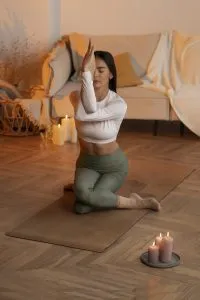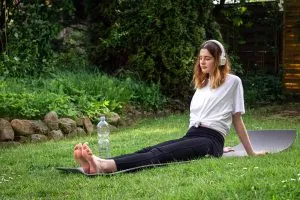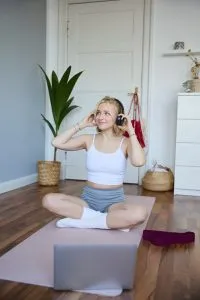Have you ever found yourself lying awake at 2 a.m., mind racing with a checklist of everything you forgot to do—or haven’t even started yet? Yeah, me too. Life gets loud. Between the demands of work, relationships, and our own internal pressure to “keep it all together,” it’s no wonder our mental health takes a hit. That’s where I found my game-changer: yoga for mental health.
And I’m not talking about acrobatic handstands on a mountaintop. I’m talking about the kind of yoga that meets you where you are—tight hamstrings, emotional baggage, and all.
In this post, we’ll dive into how yoga can support your mental well-being, particularly in managing stress and anxiety. Whether you’re a seasoned yogi or just wondering if child’s pose can really fix a bad day, stick around. Let’s explore how yoga becomes more than a stretch—how it becomes your sanctuary.
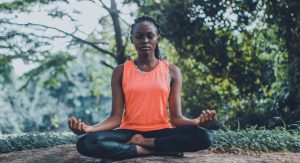
What Is Yoga for Mental Health?
Yoga for mental health isn’t a separate branch of yoga—it’s an approach to practicing yoga with your emotional and psychological well-being in mind. It weaves together movement (asana), breath (pranayama), and meditation (dhyana) to calm the nervous system and cultivate balance in the brain.
Unlike medication or therapy (both of which are incredibly important and valid), yoga offers a holistic, side-effect-free, and deeply empowering tool for your mental health toolkit.
A growing body of research—including from Harvard Health, Houston Methodist, and PMC studies—confirms what many yogis have known for years: yoga changes not just how your body feels, but how your mind works.
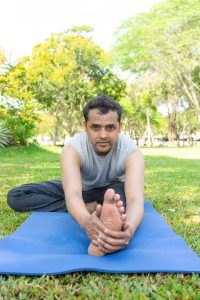
The Science-Backed Mental Health Benefits of Yoga
1. Yoga for Stress Relief
I used to carry stress like a backpack full of bricks. Yoga didn’t take the bricks away, but it taught me how to set them down.
Research shows yoga decreases cortisol levels (your stress hormone) and activates the parasympathetic nervous system—aka your “rest and digest” mode. Even a 10-minute session can calm your racing heart and slow your spiraling thoughts.
🧘 Try it: Legs-Up-the-Wall pose (Viparita Karani) is like a natural tranquilizer. Trust me.
2. Yoga for Anxiety
Anxiety feels like your brain’s alarm system won’t shut off. Yoga gives you the tools to dial the volume down.
Yoga increases levels of GABA (gamma-aminobutyric acid), a neurotransmitter that calms nerve activity. One study found that yoga practitioners had significantly higher GABA levels, which are linked to reduced anxiety and improved mood.
Breathing techniques like alternate nostril breathing (Nadi Shodhana) or box breathing can be a lifeline during anxious moments.

3. Depression and Emotional Balance
Yoga helps regulate the limbic system—the part of your brain that deals with emotions. Practices like trauma-sensitive yoga have shown incredible results, especially for those with PTSD.
One study showed that more than half of trauma survivors no longer met PTSD criteria after just 10 weeks of yoga.
Personal note: After a particularly tough year, daily morning yoga helped me emerge from a fog I didn’t even realize I was in. It didn’t solve everything, but it gave me me back.
4. Cognitive Benefits and Brain Health
Yoga increases gray matter volume, particularly in areas of the brain responsible for memory, learning, and emotional regulation. That means you’re not just calmer—you’re sharper.
According to a Harvard study, yoga practitioners had more activity in the prefrontal cortex (which handles decision-making) and less in the amygdala (which triggers fear and stress).
How Yoga Differs from Other Mental Health Strategies
Unlike medication or even talk therapy, yoga:
- Engages the body and mind simultaneously
- Is accessible without a prescription
- Has virtually no side effects
- Can be done solo or in a group
That said, it’s not a silver bullet. For some, yoga complements therapy or medication; for others, it becomes their main form of emotional maintenance.

Choosing the Right Style – Which Yoga is Best for Mental Health?
If you’re looking for yoga that targets stress and anxiety, not every style is a fit. Here’s a quick breakdown:
| Style | Best For | Considerations |
|---|---|---|
| Hatha Yoga | Beginners, gentle stress relief | Slow-paced, easy to follow |
| Yin Yoga | Anxiety, deep relaxation | Long holds, emotional release possible |
| Restorative Yoga | Burnout, nervous system regulation | Uses props, very slow and calming |
| Vinyasa Yoga | Mood boosts, energy regulation | Can be fast-paced, not ideal for acute anxiety |
| Kundalini Yoga | Breathwork and emotional clarity | Involves chanting, might not suit everyone |
My go-to? A mix of gentle Hatha in the morning and Yin at night. Like coffee and tea—each has its time.
Daily Yoga Rituals to Support Your Mental Health
Creating a regular practice doesn’t mean an hour-long power yoga session every day. In fact, consistency matters more than duration.
Here’s a simple starter routine:
- 5 min: Breathwork (Box breathing or Nadi Shodhana)
- 10 min: Gentle asanas (Cat/Cow, Child’s Pose, Downward Dog)
- 5 min: Guided meditation or silent stillness
Even 20 minutes a day can significantly improve your mental clarity, mood, and ability to cope with stress.
Apps like Insight Timer, and Headspace can help you stay motivated.

FAQs: Yoga for Mental Health
Is yoga really effective for mental health issues like anxiety or depression?
Yes. Numerous studies show yoga reduces symptoms of anxiety, depression, and PTSD. It works best when practiced regularly and in conjunction with other treatments if needed.
How long before I notice results from yoga?
Some benefits (like improved mood or less anxiety) can be felt after just one session. For deeper emotional balance, give it 3–4 weeks of consistent practice.
Do I need to be flexible to do yoga for mental health?
Not at all! Yoga meets you where you are. The point is presence, not pretzel poses.
Can I do yoga at home, or do I need a class?
Both work! Classes offer guidance and community, but home practice is convenient and easy with online resources.
What if I don’t feel better after yoga?
That’s okay. Some days the practice is more about showing up than feeling instant results. Give yourself grace, and try different styles or instructors until something clicks.

Why Yoga Works When Other Things Don’t
Here’s what sets yoga apart:
- It teaches embodied awareness—getting out of your head and into your body.
- It’s non-linear: your healing journey doesn’t have to look a certain way.
- It adapts. From your couch to a studio, there’s a practice for your mood, your schedule, and your energy.
As someone who’s tried everything from journaling to medication, yoga is the one thing I keep coming back to. It’s less of a workout and more of a homecoming.
Call to Action- Start Your Yoga for Mental Health Journey Today
Ready to give it a try? You don’t need a mat, fancy leggings, or even a teacher. Just a quiet space, a few minutes, and the willingness to breathe.
If you’re curious about gear, check out our Top-Rated Yoga Mats for Beginners and Natural Yoga Mat Cleaners to keep your space calm and clean.
Remember: your mental health matters. Yoga isn’t a cure, but it is a beautiful, supportive companion on your healing path.
Namaste, friend. 🧘♀️

